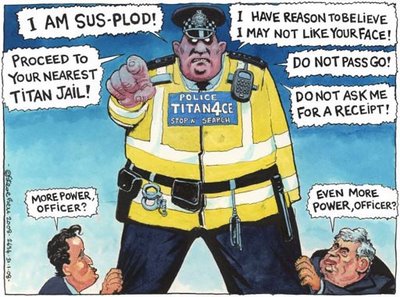Extracting rafters.
The micro-managing parallels with New Labour are so striking that we must assume Cameron genuinely intends to reprise the shtick which made Blair's lot so uniquely loathsome to the public. It is history lacking the decency to repeat itself as farce. It is merely history repeating itself.
Equally reminded of how much I abhor Amanda Platell by her attack on supposed prospective WAGs, one of those loathsome modern abbreviations. She might have something approaching a point, but it's buried beneath venomous, visceral loathing for young, naive women, and intertwined with what it's difficult to describe as anything other than the green-eyed monster:
These long-legged fillies excitedly clatter down the stairs from pavement level, their hooves shod mostly in cheap stilettos so high they make them look ridiculously tall, slightly deformed, like creatures from Avatar.
And they all have the Victoria Beckham stoop that comes with such ridiculous shoes.
The girls' legs go on for ever; as do their dreams of pulling a footballer or a millionaire.
They sway suggestively to the blaring music, drinks clutched in by acrylic-tipped fingers, waving their bottoms at passing boys, thrusting their pert breasts, stroking their bare thighs, licking their lips, tossing their hair extensions.
I am witnessing the mating ritual of the Wannabe WAG. It's a sight worthy of a David Attenborough documentary. Think of a herd of frisky wildebeest stampeding through the Serengeti plain, stopping only to drink and procreate.
The skirts are so short they leave nothing to the imagination. I swear there is only one pair of undies in that club - and I am wearing them.
I know I'm one to talk, but the writing in places is also frankly abysmal:
They behave not so much like Stepford wives, as Stepford tarts, unabashed that they are using sex to procure designer clothes, utterly complicit in the cattle market that unfolds before me wherever I go.
It goes without saying that calling them Stepford tarts doesn't even make any sense, it's just the snatching of a lazy cultural allusion: as Platell elaborates elsewhere, these young women are not submissive and docile as the Stepford wives were, they know what they want and how to get it. They're using the men they're trying to attract just as much as the men are using them.
Any wider significance of what goes on in a tiny number of exclusive London clubs is completely buried under a layer of invective that says as much about Platell as it does about the women she followed for one night. It's also the usual hysterical Daily Mail hypocrisy: as Hagley Road to Ladywood notes, it's the likes of the Mail that help to perpetuate the false notion that there's something glamorous about hanging onto the arm of a footballer or dumb rich boy by their constant and consistent coverage of them, which is far from always being sneering or hectoring in tone. Someone once said that you should extract the rafter from your own eye before attempting to to extract the straw from someone else's eye, advice that our glorious modern media will never even begin to take.
Labels: Amanda Platell, Daily Mail, Daily Mail-watch, hypocrisy, Mail-watch, Marina Hyde, weekend, weekend links, weekend round-up





